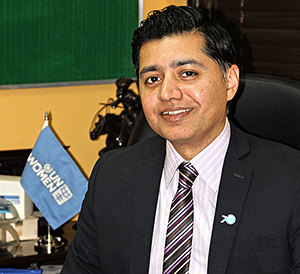Op-ed: Punjab Women’s Protection Bill: Giant Step for Humankind
Date:
Author: Jamshed M. Kazi

UN Women welcomes the passage of the Protection of Women against Violence Bill 2015 by the Punjab Assembly on 24 February 2016. The introduction of this bill, which is arguably among the strongest pieces of legislation to prevent violence against women in Pakistan and in South Asia, is an important step ahead of International Women’s Day and demonstrates the political will of the Government of the Punjab in addressing the issue of violence against women and girls. The Bill includes a broad definition of violence, steps to make complaint submissions easier, establishment of committees at the district level to investigate complaints, and other built-in implementation mechanisms through the establishment of one-stop Violence Against Women Centres (VAWC) in all districts, court orders, and introduction of GPS tracked electronic devices on perpetrators to enforce protection orders.
These are all much-needed measures that are welcomed by most civil society organizations, human rights institutions, Women’s Commissions at federal and provincial level, female citizens of Pakistan as well as an increasing number of men. Considering the troubling statistics regarding the prevalence of violence against women in Punjab, which are among the highest in the country, it has become all the more important to legislate effectively to curb this societal menace. According to the data gathered by Aurat Foundation, an NGO working for women rights, as many as 7,010 cases of violence against women were reported in Punjab in 2014. Similarly, 1,707 cases of kidnapping were reported during the year, while those of rape and gang rape numbered 1,408. Honor killings too were highest in Punjab compared to the other provinces, coming to around 340 reported cases. The NGO recorded that six women were kidnapped, four raped, three committed suicide and six were murdered every single day in Pakistan, in the same year.
The Bill was conceived with a human rights based and comprehensive approach in mind and seeks to establish what good practice legislation should focus on, namely:
- Acknowledging that violence against women is a form of discrimination, a manifestation of historically unequal power relations between men and women, and a violation of women’s human rights;
- Defining discrimination against women as any distinction, exclusion or restriction made on the basis of sex which has the effect or purpose of impairing or nullifying the recognition, enjoyment or exercise by women, irrespective of their marital status, on a basis of equality of men and women, of human rights and fundamental freedoms in the political, economic, social, cultural, civil or any other field;
- Providing that no custom, tradition or religious interpretation may be invoked to justify violence against women.
In countries like Pakistan where some customary laws co-exist alongside codified law, treaty bodies have been concerned about the use of discriminatory customary law and practice, despite laws enacted to protect women from violence. In light of these concerns, treaty bodies, and in particular the United Nations Committee on the Convention on the Elimination of All Forms of Discrimination against Women (CEDAW), have called upon States parties, including Pakistan to ensure that:
- Violence against women is prosecuted and punished;
- Women victims of violence have immediate means of redress and protection; and
- Public officials, especially law enforcement personnel, the judiciary, health-care providers, social workers and teachers, are fully familiar with applicable legal provisions and sensitized to the social context of violence against women
Like anywhere else in the world, drafting of laws remains a combination of technical rigor in accordance with best legislative practices coupled with an element of political accommodation through democratic processes. Some of the critiques on the Bill is that it is more procedural in nature and does not unequivocally criminalize VAW. The definition of various forms including cyber-crimes may need to be more clearly defined and marital rape is not explicitly spelled out as a manifestation of violence. Punjab’s Women’ Protection Bill in that sense cannot be termed perfect, but it is still a giant step in the right direction for the benefit of humankind. We must dispel the zero-sum notion that just because this law is good for women, it must be bad for men.
If the bill is backed by the adequate resources, awareness creation and successfully implemented with the same zeal and commitment as it was drafted, debated and passed in the Assembly, then it has the potential to bring monumental change for women in Pakistan. It promises women the sense of protection that they desperately require, being surrounded by a social nexus in which the consistent abasement and abuse of women is perpetuated under the guise of traditional values. The change in law would make a difference if there is effective enforcement and the legislature continues to engage with the issue and ensures oversight. As pointed out by the Human Rights Commission of Pakistan, the onus also lies on civil society organizations and the media to assess the law, the pace of implementation and also the impact it has on protecting women from violence.
UN Women advocates for the continued adoption and enforcement of national and provincial laws to address and punish all forms of violence against women and girls in Pakistan. This is in line with Pakistan’s obligation under CEDAW, consistent with international human rights standards, and is one of the five key outcomes which the UN Secretary-General’s campaign “UNiTE to End Violence against Women” set out to achieve in all countries by 2015.
About the author
Jamshed M. Kazi is the UN Women Country Representative for Pakistan. He expressed his opinion on the Punjab’s recent passage of legislation to prevent violence against women, to mark the occasion of International Women’s Day – 8 March
For more information:
Please contact: Faria Salman
Strategic Management and Partnerships Officer & Communications Focal Point for UN Women Pakistan
Email: [ Click to reveal ]